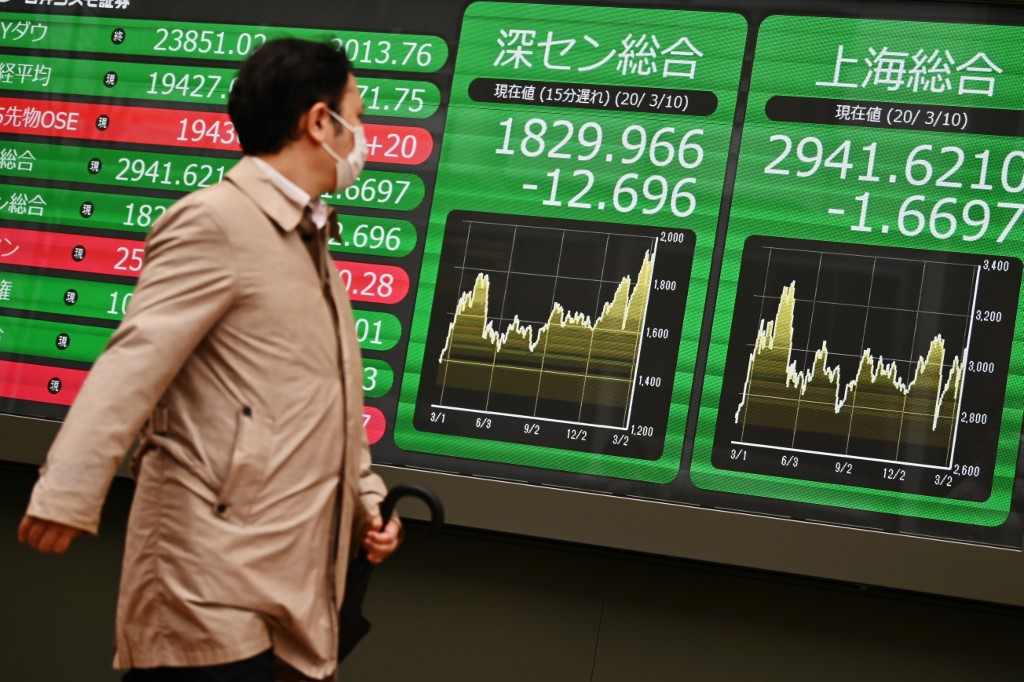(ATF) Shares in Asia were mixed on Wednesday after surging coronavirus infections in Europe and the United States created fears of a return to lockdowns, which could damage the fragile global economic recovery.
In Asia, which has endured less severe Covid-19 outbreaks since the initial crisis in Wuhan, stocks showed initial resilience before declining slightly.
The Nikkei 225 was down 0.3% at 23,418.51 when it closed in Tokyo, while the Hang Song Index also fell 0.3% to close at 24,708.80.
In Shanghai, the Composite was up 0.5% to 3,269.24 the close. The MSCI’s ex-Japan Asia index lost 0.1%, despite China’s CSI300 and South Korea making gains.
China has Covid outbreaks currently in Xinjiang, where officials have announced a plan to test millions of resident, plus there has been unconfirmed reports of a fresh outbreak in Shanghai. Chinese accounts of the severity of the coronavirus epidemic are treated with some scepticism in other parts of Asia, because of the regime’s reputation for censoring sensitive information and suspicion that Beijing is not always told what is really going on in the provinces.
Meanwhile, uncertainty was apparent in currency markets too: One-week implied volatility indicators for the euro and the yen rose to their highest in nearly seven months.
The same measure of volatility for the Chinese yuan also spiked, hitting its highest since January 2016.
And the dollar edged up 0.1% against a basket of currencies.
Concerns over a second wave of infections were also evident in currency and bond markets, too, with the euro slumping 0.4% against the dollar, while German government bond yields hit their lowest since March.
Wall Street saw a mixed day on Tuesday, with the S&P 500 losing 0.3% but the tech-heavy Nasdaq Composite climbing 0.6%.
Apple, Amazon.com, and Google-parent Alphabet report later this week, closely watched because they have been among the few winners from the pandemic.
US election spurs uncertainty
Adding to the mood of uncertainty is the November 3 US presidential election.
Former Vice President Joe Biden has enjoyed a consistent lead over President Donald Trump, prompting investors to cautiously bet on his victory and possibly a “blue wave” outcome, where Democrats take back the Senate as well.
But Wall Street’s volatility index (VIX), a measure of market expectations in share price swings, rose to 36.60, its highest since early September.
That is a product of wariness that the election outcome itself could be contested, some market players say. An unclear result could leave expectations of a US fiscal stimulus package to counter the coronavirus pandemic in limbo.
“It is not yet clear that we will have a winner at this time (next week) as many State Secretaries and voting commissions are hedging their bets that they will indeed be able to project the winner by next Wednesday morning,” Deutsche Bank analysts wrote.
European shares down
European shares fell on reports of potential lockdowns in Germany and France, losing 2.5% to hit five-month lows, rattled by a media report that France might bring in a national lockdown from midnight on Thursday.
The Paris index was among the hardest hit, losing 3.5% to touch its lowest since May.
German shares slumped 3.2% to their lowest since June, after a report Chancellor Angela Merkel wanted to close restaurants and bars to curb new infections.
In Europe, automakers and banks led the losses, falling 4.2% and 3.9% respectively.
Wall Street futures lost 1.3-1.6%.
The United States, Russia, France and others have seen record numbers of infections in recent days, with European governments introducing new curbs that investors fear could maul the already fragile recoveries.
“The appetite of the different countries’ authorities to enforce new lockdowns – that’s the point of discrimination between good market performance and bad market performance,” said Alessia Berardi, senior economist at Amundi.
“The second wave is now clearly very strong in Europe.”
The MSCI world equity index, which tracks shares in 49 countries, fell 0.6%.
ATF China Bond 50 Index: ATF indexes rise on industrial and bank gains
Also on Asia Times Financial
First CDRs open for subscription on China’s STAR market
China forming a national alliance to build its own chip industry
New energy vehicles will reach 20% by 2025: China auto group
Asia bonds: building blocks for resilient portfolios
Rare earth coating for glass can save energy by 25-40%, Baotou says
India signs intel-sharing deal with the US
Asia Stocks
# Japan’s Nikkei 225 index slipped 0.3%
# Hong Kong’s Hang Meng also fell 0.3%
# the Shanghai Composite rose 0.5%
# The MSCI ex-Japan index lost 0.1%.
Key figures around 1100 GMT
London – FTSE 100: DOWN 1.7% at 5,633.57 points
Frankfurt – DAX 30: DOWN 3% at 11,703.28
Paris – CAC 40: DOWN 2.7% at 4,601.99
EURO STOXX 50: DOWN 2.8% at 2,985.80
New York – Dow: DOWN 0.8% at 27,463.19 (close Tuesday)
Euro/dollar: DOWN at $1.1744 from $1.1796 at 2100 GMT
Dollar/yen: DOWN at 104.17 yen from 104.42 yen
Pound/dollar: DOWN at $1.2973 from $1.3044
Euro/pound: UP at 90.45 pence from 90.43 pence
West Texas Intermediate: DOWN 4% at $39.00 per barrel
Brent North Sea crude: DOWN 3.2% at $39.88 per barrel
With reporting by Reuters and AFP
























